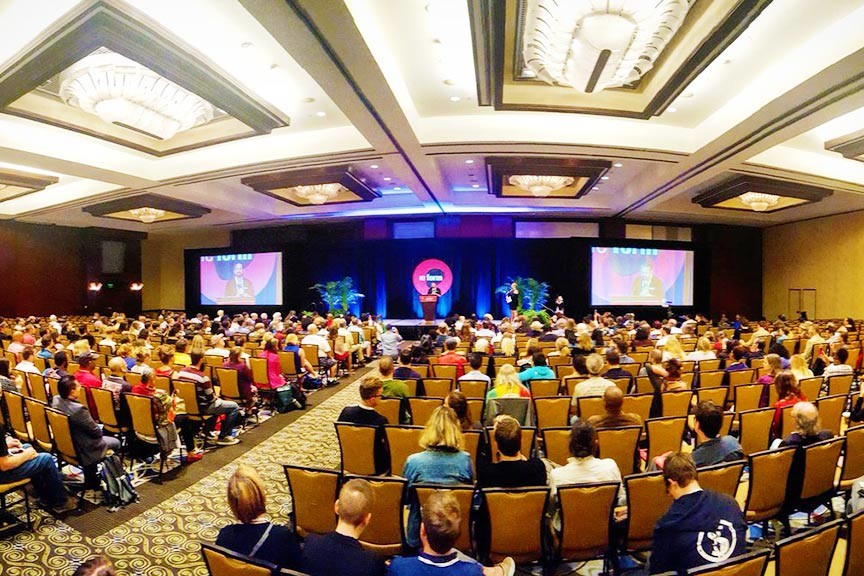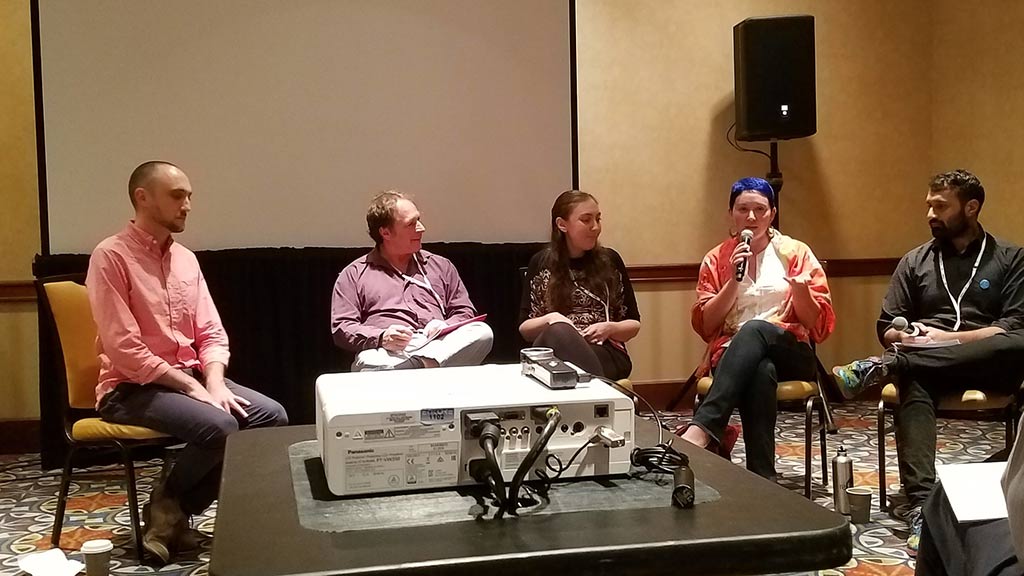International Drug Policy Reform Conference Brings Harm Reduction into Spotlight
My destination was the International Drug Policy Reform Conference (Reform 2017). Judging by the throng of young college students crowding the lobby, I knew we were in the right place.

Psymposia is a 501(c)(3) nonprofit research and media organization that offers critical perspectives on drugs, politics, and culture. We rely on contributions from our readers and listeners. Your support is vital to sustaining Psymposia.
Support Psymposia’s independent journalism on Patreon and help us drive the Mystery Machine! We’re a bunch of meddling kids who are unmasking the latest shenanigans on the psychedelics beat.
Ipulled into the Omni Hotel at the CNN Center in downtown Atlanta, Georgia just after noon on Friday, October 13, 2017. My destination was the 2017 International Drug Policy Reform Conference (Reform 2017), hosted by the Drug Policy Alliance (DPA). DPA hosts this conference every two years to bring together people from around the world with the shared goal of ending the War on Drugs.
Psymposia’s Expansion Director Mike Margolies was expecting us at the Psymposia exhibitor table, a prime spot from which to peddle T-shirts and solicit donations.
The first entrance to the Omni Hotel we tried, I knew we were in the right place, judging by the throng of young college students crowding the lobby: Students for Sensible Drug Policy (SSDP) had made a strong showing here at Reform, with over 70 students and staff members in attendance.
We broke away a few minutes later to continue up towards the fourth floor. We passed a woman proudly wearing a SHE’S SO VOCAL t-shirt, identifying her with the fearless harm reduction group from back home. We spoke later that weekend with one of their members, Levele Pointer. He connected the Drug War to inequities in criminal justice in his home city of New York.
“One of the things that’s really central to me is Rikers Island,” he said. “People are getting arrested and put on Rikers Island, they’re not being afforded legitimate bails, and they’re being arrested for crimes that are violations. It’s become this big juggernaut and correctional officers are not capable of dealing with the issues they’re being asked to deal with, such as mental illness. So they deal with it in a violent manner. If we opened up the mental institutions and allowed people to get the proper help they need, and we got affordable bails, we wouldn’t need Rikers Island as we know it today.”
My friend Sierra and I reached level 4, where all the exhibitors were. We walked towards the back, past a big yellow DanceSafe tent. The displayed buckets full of wristbands, safe snorting kits, and colored info cards about drugs like DMT and heroin. Beside them at a smaller table was the Georgia Harm Reduction Alliance, who distributed safe sex kits and explained where attendees could get trained to use naloxone.
Harm reduction—in a time when tens of thousands of Americans are dying each year from opioid overdose—was a major topic and concern at Reform. We spoke about this issue with Kevin Garcia, an SSDP member from Florida:
“Something we’ve been pushing for in my community is trying to equip police officers with naloxone,” he said. “We’ve gotten them to accept that starting a pilot program would be something very useful for our university. We were able to collaborate with the police as well as the Department of Children & Families. It’s a lot like having a defibrillator on campus. It’s there as a safety measure to reduce any harm that might come and it’s the same thing with naloxone.”
Reform addressed other aspects of harm reduction, too. We spoke with New York-based writer Julie Holland, MD about its role in therapy:
“One of the things that’s driving problematic drug use,” she said, “is people feeling sort of displaced and disconnected and not having strong social ties and not having therapeutic relationships. And I think sometimes psychiatry can make things worse and not better. There are issues of stigma or shame with drug use that get played out in therapy a little bit. With a harm reduction framework, you really accept where the person is at and you really work within their framework and what their goals are so you get rid of a lot of the stigma and shame that way.”
We observed visitors of every size, color, and age. Reform brought together a diverse array of academics, advocates, students, lawyers, writers, and other supporters from all over the world. Attendees came from all corners of the United States as well as the United Kingdom, Ireland, Mexico, Brazil, Russia, Japan, Kenya, and Zimbabwe—to name a few.
“Who are we, the drug policy reform movement?” said Ethan Nadelmann, the retired DPA founder and executive director, when we caught up with him. “We’re the people who love drugs, the people who hate drugs, the people who don’t give a damn about drugs, but every one of us thinks the War on Drugs is not the way to deal with this.”
The last conference was held in 2015, making this the first Reform of the Trump era. This conference focused strongly on global Drug War issues, as well as domestic.
One of the issues discussed was President Rodrigo Duterte’s impact on the Drug War in the Philippines. “Drug policy [in the Philippines] is still based on the thinking that all drug use is bad and needs to be punished,” said Filipino native Ma.Inez Feria. “Maybe 60% of the people in jail now are there for drug-related cases, a little higher now since this past year. About half of those are there for use and possession, non-violent. And if you look at the demographics, most of them are from low-income and low-education families. So there’s a lot of injustices that are happening, but people don’t see it.”
The theme of racial injustice and its role in the Drug War came up again and again.
“We still have black and brown people incarcerated [in the UK] at a way higher rate than white people,” said Camille Barton of London. “A Ministry of Justice report that just came out shows the UK incarcerates a higher percentage of the black population than the US does. So you’re more likely to go to jail if you’re a black person in England than here. I really appreciate this conference for centralizing racial justice in policy and in the War on Drugs, because it really does dominate. This is a liberating space for us to work on the deeper issues and build powerful connections.”
After lunch, Mike texted me and urged us to come to a community meeting on psychedelic law hosted by the Multidisciplinary Association for Psychedelic Science (MAPS). The meeting was led by another friend of ours, Ismail Ali, and his colleague, Natalie Ginsberg. We arrived several minutes late, making an awkward entrance in the small room and squeezing into a table next to Mike and a new friend, Jag Davies (DPA). We split into four discussion groups; our table’s topic was psychedelics in criminal justice.
“I’m saying full-speed-ahead with decrim,” Mike said. “But I’m cautious about legalization. What I’m seeing is that even in states that have legalized [cannabis], cops are still arresting and prosecuting the most vulnerable citizens.”
“But look at Colorado,” Jag said, “arrests have gone way down!” The table then erupted into several smaller arguments, as we all debated this or that legal or policy framework for legalizing psychedelics.
Jag later explained to me in greater detail his ideas on this issue. “We ultimately want to legalize psychedelics,” he said, “but there’s a lot of work that needs to be done to change the way psychedelics are perceived and managed. The people who’ve always been victimized the most by prohibition, young people, people of color, aren’t really gonna be helped at all by [legalization]. So I think it’s really important we don’t put all our eggs in the basket of just legalizing psychedelic therapy, but we also think about how to reduce the harms of prohibition, and we have to do that very carefully and strategically.”

After a day packed with intriguing talks and lots of mingling with great minds, Sierra and I decided to take a step outside, where we were approached by three men.
“Excuse me, my friend,” said the tallest of the trio, “Do you know how we are going to reach the Park Bar?” His accent revealed he was an international visitor.
“The Park Bar?” I repeated. “No, what’s that?”
“You are with the drug conference?” the man said. “We are trying to go to the Park Bar. They are saying it is for international attendees.” He introduced himself as Wilson, from Zimbabwe. His two companions, Lugard Abila and Kitale, were from Kenya.
We spoke later with Lugard, who shared his thoughts about coming to his second Reform conference:
“[This] has been a journey of learning how can you help those in need,” he said, “how can you stand up for those who are helpless, for someone you love. The only way you can do that is by speaking out, coming out, and shouting louder about your particular issue. So DPA has really sharpened my skills in learning how to debate your issues with the key decision makers like the political class and the religious leaders.”
It turned out the Park Bar was a short walk away. “Excellent!” Wilson said. “Will you please come with us?” And so we soon found ourselves in a homey tavern surrounded by a crowd of foreign drug policy activists.
And so our first day at Reform 2017 came to an end, as we flirted with conference-goers both new and familiar, indulged in cold ales, and took lots of group pictures. I joined in a (slightly intoxicated) discussion with our African friends and a man from the Netherlands about President Donald Trump and the future of global liberal democracy. Sierra and I finally decided to take a cab home around midnight, knowing we had a full day ahead of us and limited opportunity for sleep.
“I have seen the suffering firsthand of what the Drug War is doing and I have not seen one iota of evidence that it is stopping people from using drugs,” said Lyn Ulbricht, mother of Ross Ulbricht, when we spoke with her that weekend. “I’m here because I’ve learned so much about the Drug War since this happened to Ross, and have seen the suffering not just of him and our family but all the families I’ve gotten to know in the past four years visiting him in the prison.”
It was a sobering reminder of what started us all down this path. No matter what aspect of drug policy it was that brought us to Atlanta that weekend, no matter our disagreements over the solutions and the legislative proposals, no matter what country we were from and the particular issues facing us, we all understood that people’s lives are being destroyed every day by the War on Drugs, and this must end.
Hey! Before you go… Psymposia is a 501(c)(3) non-profit media organization that offers critical perspectives on drugs, politics, and culture. We strive to ask challenging questions, and we’re committed to independent reporting, critical analysis, and holding those who wield power accountable.
Our perspectives are informed by critical analysis of the systemic crises of capitalism that have directly contributed to the unmitigated growth of addiction, depression, suicide, and the unraveling of our social relations. The same economic elite and powerful corporate interests who have profited from causing these problems are now proposing “solutions”—solutions which both line their pockets and mask the necessity of structural change.
In order for us to keep unpacking these issues and informing our audience, we need your continuing support. You can sustain Psymposia by becoming a supporter for as little as $2 a month.





